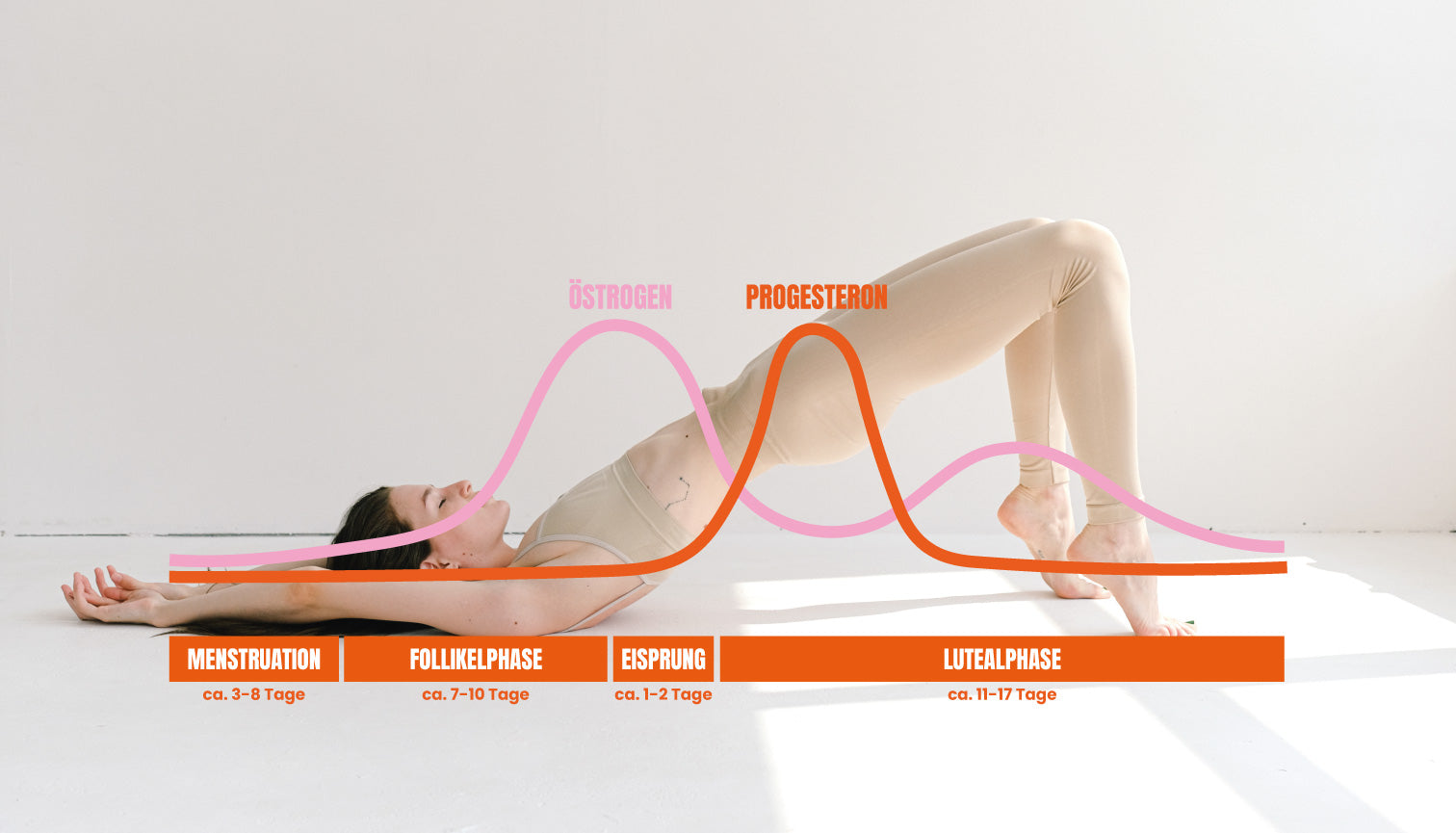
KNOW YOUR FLOW: WHAT YOU SHOULD KNOW ABOUT YOUT CYCLE
Written by Céline from FEMALIGN
10. November 2023
When talking about menstruation and the cycle, somehow there are still a lot of taboos and a lack of clarity. Quite sad, considering that roughly 50% of the population has a uterus...
True to the motto "know your flow" we want to educate you once and for all by giving you the most important facts about how the female* menstrual cycle actually works.
Let's jump in!
HOW LONG DOES A CYCLE TYPICALLY LAST?
Starting with the most important piece of information: the common statement that a normal* cycle should last exactly 28 days is actual bullshit.
Your cycle is considered normal* when it lasts roughly between 23 to 25 days. By the way, it is also considered normal* when the duration of your cycle varies from cycle to cycle within that time frame. It's actually pretty rare to have an identical cycle length each cycle (except when you are on the pill, but in that case you don't have a cycle at all!).
If your cycles are regularly considerably shorter or longer than the addressed time frame, if the cycle length is varying drastically from cycle to cycle or your period is not coming at all, there is the chance that you may have a menstrual disorder. In that case, you should pay your doctor a visit just to be sure.
WHY SHOULD YOU ENGAGE WITH YOUR CYCLE?
That's an easy one. After all, your cycle will accompany you for many years of your life. You can't simply put a hold to it, at least not if you are not using hormonal contraceptives.
Knowing exactly what's happening in your body and how it affects you gives you way more control over yourself and your life. You can adjust to the phases and all related symptoms and learn how to deal with them. You can find methods and routines that make your daily life easier along the 4 phases of the cycle, know exactly when your period is coming and when you are fertile or not.
The result: you have a lot more confidence and are actually aligned both with yourself and your body.
WHAT PHASES DO YOU GO THROUGH ALONG THE CYCLE?
The menstrual cycle can be split into four phases of varying lengths in which your hormones and therefore your mood and well-being are constantly changing:
- Phase 1: the period
- Phase 2: the follicular phase
- Phase 3: ovulation
- Phase 4: the luteal phase
We will now show you how long each phase lasts, what happens in your body and with your hormones and how this affects your mood.

PHASE 1: THE PERIOD aka please leave me alone (Duration: approx. 3 - 8 days)
Each new cycle begins on the first day of your period.
If there was no implantation of a fertilized egg in the previous cycle, i. e. you are not pregnant, your uterine lining, which was built up in the previous cycle, will be shedding during menstruation.
At this stage, the female sex hormones estrogen and progesterone are at their lowest levels.
Due to the low level of hormones, there is a good chance that you feel tired, lacking energy, sad and sensitive and do not have a strong desire for social surroundings. Many withdraw during the period and just want to be alone. Due to the annoying accompanying physical symptoms such as back pain, abdominal cramps, diarrhea or headache, you might also feel uncomfortable and less confident during this phase.
PHASE 2: THE FOLLICULAR PHASE aka let's have some fun (Duration: approx. 7 - 10 days)
Once your period is over, the next phase comes into play: the follicular phase.
During this phase, your brain releases the so-called follicle-stimulating hormone (FSH). This stimulates the maturation of follicles in your ovaries. Follicles are small "bubbles" filled with fluid in which egg cells mature. During the follicle phase, usually only one follicle forms as dominant and continues to grow - this is the follicle that bursts when you ovulate.
The follicles produce estrogen, resulting in an increasing estrogen level during the follicular phase.
The benefit: the increasing estrogen level usually has a positive effect on your mood (and other things).
Normally, your energy and pleasure levels will increase. Many feel more confident, motivated and creative during the follicular phase. Oftentimes, this leads to generally being happier and fulfilled, having a greater desire for social contacts. FYI: your libido usually rises here too!
PHASE 3: OVULATION aka I guess I can do it all (Duration: approx. 1-2 days)
Ovulation, baby!
You've probably heard about ovulation many times before, but do you actually know what's going on in your body during ovulation? If you're not sure, no worries, we'll explain.
During ovulation, your estrogen levels peak. As a result, your brain releases the so-called luteinizing hormone (LH), which causes the matured follicle to burst and release an egg cell. The egg cell then travels through the fallopian tubes into your uterus and is now waiting to be fertilized by a sperm. The egg cell is now fertile for a short period of roughly 24 hours.
Basically, your body is preparing for the possibility of becoming pregnant. But hey, that doesn't mean you're gonna be a mom. It just means that you're particularly fertile at this stage. If you want to get pregnant, now's the best time. If not, you should be a little more careful here. Giving up sex altogether is difficult, however, since during ovulation your testosterone (male sex hormone) levels are elevated, which often causes your libido to peak during the cycle.
Ovulation is often considered the best phase for many when it comes to their mood: along with the estrogen peak, your energy level, your motivation, your self-confidence, your libido and your desire for social contacts are at their highest. Enjoy it while it lasts!
PHASE 4: THE LUTEAL PHASE aka sorry, I can't talk right now (Duration: approx. 11-17 days)
The final countdown!
With the end of ovulation and the onset of the luteal phase, this is where the fun part really starts (irony).
After your dominant follicle bursts and releases an egg cell, the empty follicle now becomes a so-called corpus luteum.
The corpus luteum produces the hormone progesterone, which plays an important role in the luteal phase. The rising progesterone level prepares your uterine lining for the implantation of a fertilized egg.
If your egg cell has not been fertilized, i. e. you have not become pregnant, the corpus luteum dies after a few days. Then your estrogen and progesterone levels drop, your period starts and a new cycle starts all over again.
By the way, during the luteal phase there is also a second estrogen peak - a real hormonal chaos, which can affect your mood during this phase.
The hormonal roller coaster causes many to feel tired, anxious, sad and irritable. You may also feel an increasing need to withdraw again and avoid social activities. The luteal phase, especially the days before your next period, is the moment when many suffer from PMS (Premenstrual Syndrome).
Symptoms of PMS include mood swings, chest pain, abdominal pain, back pain, headache, bloating, cravings, nausea, loss of drive, and much more.
*Note: normal is used as a simplification and does not necessarily mean that your cycle is healthy only if it is within the specified range - even here there may be individual slight deviations, as always!

CREATED BY WOMEN.
We are Céline and Carolin, the founders of FEMALIGN. We take your skincare and well-being during your cycle to a new level.

